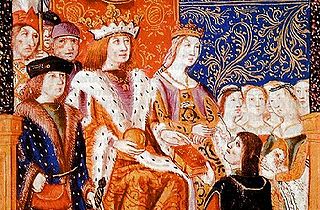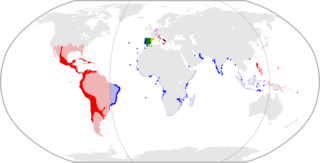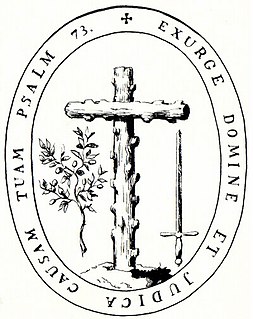
The Inquisition was a group of institutions within the government system of the Catholic Church whose aim was to combat heresy. It started in 12th-century France to combat religious dissent, in particular the Cathars and the Waldensians. Other groups investigated later included the Spiritual Franciscans, the Hussites and the Beguines. Beginning in the 1250s, inquisitors were generally chosen from members of the Dominican Order, replacing the earlier practice of using local clergy as judges. The term Medieval Inquisition covers these courts up to mid-15th century.

Moriscos were former Muslims and their descendants who were pressured heavily by the Catholic church and the Spanish Crown under the threat of death to convert to Christianity after Spain outlawed the open practice of Islam by its sizeable Muslim population in the early 16th century.

A converso, "convert", was a Jew who converted to Roman Catholicism in Spain or Portugal, particularly during the 14th and 15th centuries, or one of their descendants.

The Catholic Monarchs is the joint title used in history for Queen Isabella I of Castile and King Ferdinand II of Aragon. They were both from the House of Trastámara and were second cousins, being both descended from John I of Castile; on marriage they were given a papal dispensation to deal with consanguinity by Sixtus IV. They married on October 19, 1469, in the city of Valladolid; Isabella was eighteen years old and Ferdinand a year younger. It is generally accepted by most scholars that the unification of Spain can essentially be traced back to the marriage of Ferdinand and Isabella. Some newer historical opinions propose that under their rule, what later became Spain was still a union of two crowns rather than a unitary state, as to a large degree Castile and Aragon remained separate kingdoms, with most of their own separate institutions, for decades to come. The court of Ferdinand and Isabella was constantly on the move, in order to bolster local support for the crown from local feudal lords.

The suppression of the Jesuits in the Portuguese Empire (1759), France (1764), the Two Sicilies, Malta, Parma, the Spanish Empire (1767) and Austria and Hungary (1782) is a complex topic. Analysis of the reasons is complicated by the political maneuvering in each country which was not carried on in the open but has left some trail of evidence. The papacy reluctantly went along with the demands of the various Catholic kingdoms involved, and advanced no theological reason for the suppression.

Carlo Ginzburg is a noted Italian historian and proponent of the field of microhistory. He is best known for Il formaggio e i vermi, which examined the beliefs of an Italian heretic, Menocchio, from Montereale Valcellina.

William II de Croÿ, Lord of Chièvres was the chief tutor and First Chamberlain to Charles V.

The Revolt of the Comuneros was an uprising by citizens of Castile against the rule of Charles V and his administration between 1520 and 1521. At its height, the rebels controlled the heart of Castile, ruling the cities of Valladolid, Tordesillas, and Toledo.

The Council of Castile, known earlier as the Royal Council, was a ruling body and key part of the domestic government of the Crown of Castile, second only to the monarch himself. It was established under Queen Isabella I in 1480 as the chief body dealing with administrative and judicial matters of the realm. With the 1516 ascension of King Charles I to the throne of both Castile and Aragon, the Royal Council came to be known as the Council of Castile because Charles was king of many dominions other than Castile, while the Council retained responsibility only over Castile.

The Tribunal of the Holy Office of the Inquisition, commonly known as the Spanish Inquisition, was established in 1478 by Catholic Monarchs Ferdinand II of Aragon and Isabella I of Castile. It was intended to maintain Catholic orthodoxy in their kingdoms and to replace the Medieval Inquisition, which was under Papal control. It became the most substantive of the three different manifestations of the wider Catholic Inquisition along with the Roman Inquisition and Portuguese Inquisition. The "Spanish Inquisition" may be defined broadly, operating in Spain and in all Spanish colonies and territories, which included the Canary Islands, the Spanish Netherlands, the Kingdom of Naples, and all Spanish possessions in North, Central, and South America. According to modern estimates, around 150,000 were prosecuted for various offenses during the three centuries of duration of the Spanish Inquisition, out of which between 3,000 and 5,000 were executed.
Henry A. Kamen is a British historian, who has published extensively on Europe, Spain, and the Spanish Empire.

The Battle of Villalar was a battle in the Revolt of the Comuneros fought on April 23, 1521 near the town of Villalar in Valladolid province, Spain. The royalist supporters of King Charles I won a crushing victory over the comuneros rebels. Three of the most important rebel leaders were captured, Juan de Padilla, Juan Bravo, and Francisco Maldonado. They were executed the next day, effectively ending armed resistance to Charles I.

William de Croÿ ; was Archbishop of Toledo from 1517–21. He was born in the Burgundian Netherlands and died in Worms, Germany.

Castile and León Day is a holiday celebrated on April 23 in the autonomous community of Castile and León, a subdivision of Spain. The date is the anniversary of the Battle of Villalar, in which Castilian rebels called Comuneros were dealt a crushing defeat by the royalist forces of King Charles I in the Revolt of the Comuneros on April 23, 1521.
Military conflict in the Revolt of the Comuneros spanned from 1520 to 1521. The Revolt began with mobs of urban workers attacking government officials, grew to low-level combat between small militias, and eventually saw massed armies fighting battles and sieges. The comunero rebels gained control of most of central Castile quite quickly, and the royal army was in shambles by September 1520. However, the comuneros alienated much of the landed nobility, and the nobility's personal armies helped bolster the royalist forces. The Battle of Tordesillas in December 1520 would prove a major setback for the rebels, and the most important army of the comuneros was destroyed at the Battle of Villalar in April 1521.

Joseph Pérez is a French historian specializing in Spanish history. Pérez has specialized in the births of the modern Spanish state and the Latin American nations. Among his books, he examines the independence movements of Latin America; Ferdinand and Isabella, the Catholic Monarchs; Holy Roman Emperor Charles V, and Philip II of Spain.
Antonio de Zuñiga y Guzman,(c.1458 – 1533), Prior of Castile, Order of Saint John of Jerusalem, Plasencia, Spain, was the general of the Royal Army against the Revolt of the Comuneros and a Viceroy of Catalonia from 1523 - 1525.
Juan de Lucena (1430–1506) was a Spanish humanist.
The Alhambra Decree was an edict issued on 31 March 1492, by the joint Catholic Monarchs of Spain ordering the expulsion of practicing Jews from the Kingdoms of Castile and Aragon and its territories and possessions by 31 July of that year. The primary purpose was to eliminate their influence on Spain's large converso population and ensure they did not revert to Judaism. Over half of Spain's Jews had converted as a result of the religious persecution and pogroms which occurred in 1391. Due to continuing attacks around 50,000 more had converted by 1415. A further number of those remaining chose to convert to avoid expulsion. As a result of the Alhambra decree and persecution in prior years, over 200,000 Jews converted to Catholicism and between 40,000 and 100,000 were expelled, an indeterminate number returning to Spain in the years following the expulsion.:17

















